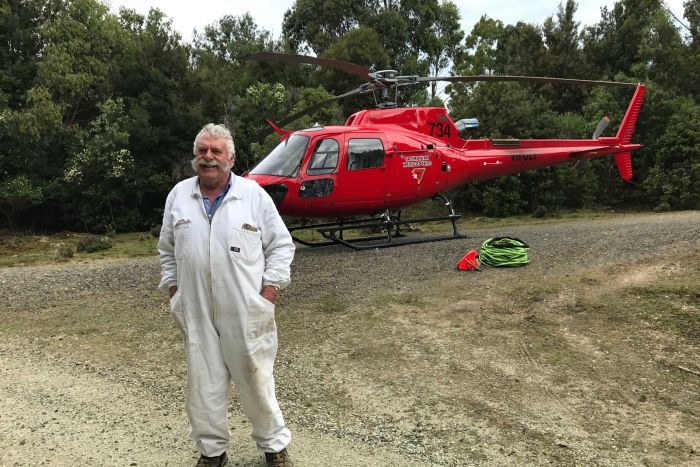Beehives airlifted to Tasmania's leatherwood trees to bypass flood-damaged bridge
Posted
A Tasmanian beekeeper is going to extreme lengths to ensure his bees can collect pollen from leatherwood trees found in remote parts of the state's rainforest.
Lindsay Bourke moves some of his 4000 hives to leatherwood sites in the Arthur River Forest Reserve each year.
Last June major flooding washed away Pykes Bridge, cutting off access to those sites.
Determined to access the sites this year, Mr Bourke organised more than 200 beehives to be dropped into place by helicopter, an Australian first.
"Seventy to 90 per cent of all of our honey in Tasmania is leatherwood. This is the only opportunity we have to get honey," Mr Bourke said.
"That's why we [are going] to such desperate measures."
Nearly 1 million bees in 216 hives were trucked into a leatherwood reserve last week.
A special helicopter rig, able to hold eight hives at a time, was custom-built in Queensland for the operation.
The hives were loaded onto the rig and flown across the Arthur River and then dropped into place by helicopter, over five hours.
Six beekeepers were involved in the relocation, including Dailan Hales.
"I've never heard of it being done before, anywhere in Australia," he said.
"We need access to the leatherwood. Without this site, we'd be in trouble."
Beekeeper Richard Cusack was thrilled to be involved.
"[I'm] loving it, best day ever, best beekeeping day ever," he said.
Pilot Bruce Colwell headed up the operation from the air.
"I've done lots of aerial crane stuff but nothing with bees, it's pretty interesting," he said.
"I just tried to steady the load and bring it into a position like I would any other load and try not to make a motza of it."
Pykes Bridge cannot be repaired until the water level recedes, which is anticipated in the coming weeks.
It is hoped the repairs will be completed by March, which is when the hives will need to be collected from the site and moved again.
New opportunity for beekeepers
Leatherwood trees are only found in small pockets in the Tasmanian rainforest.
Mr Bourke said he hoped the technique of flying in hives would provide greater access to new areas of leatherwood currently inaccessible by road.
"There's no more [road-accessible] leatherwood in Tasmania, we've picked it's bones out and there's none left," he said.
"Maybe we'll be able to do this now and we'll be able to expand like all the other wonderful agricultural industries.
"Let's give it a try and you never know, it may pay off."
It is good news for Tasmania's honey producers, who are struggling to keep up with demand.
Last year Tasmania's leatherwood honey named the "World's Best" but only 1000 tonnes of it is produced each year.
Mr Bourke said the lack of leatherwood limited supply.
"There's consumer demand," he said.
"We say, look, you can have so much, and I'll deliver it and that is the price."
Shortage of bees for pollination
Tasmania's booming seed crop industry relies heavily on bees for pollination.
Mr Bourke said it was vital the bees spent time collecting pollen and nectar in the forest to be strong and effective pollinators.
"We need to get the nectar, the proper honey that has pollen in it to get the bees through the winter," he said.
Clive Ockenden is the seed production coordinator at Bejo Australia, which oversees more than 120 seed crops across Tasmania.
"When the crops start flowering and both parent lines start flowering at the same time, we get the bees in and we put about 10 hives of bees per hectare of crop, and they fly out and pollinate the crop for us," he said.
"Pollination is a vital part. A little bit of pollination is done by native and other insects but the bees play the major part."
Lindsay Bourke said demand for bees for pollination had never been higher.
"We've had to expand our operation this year to keep demand with all the pollinating needs that we have for … carrot and clover crops that are growing ever so much that we just can't keep up," he said.
"They've already told us they need ... even more bees next year so we need to keep on expanding with the pollinating requirements.
"[Greater access to leatherwood] would be wonderful for the pollinating requirements that Tasmania is going through."
Topics: agribusiness, agricultural-crops, rural, tas
















